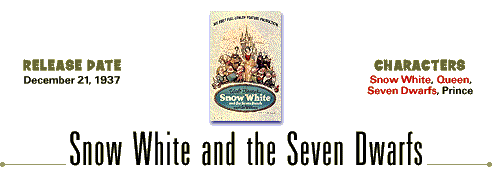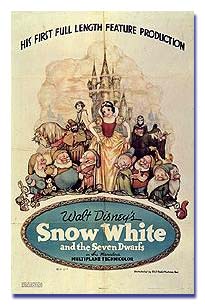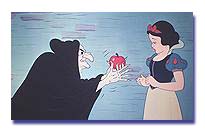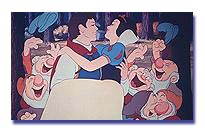 |
 |
 |
 beautiful girl, Snow White, takes refuge in the
forest in the house of seven dwarfs to hide from her stepmother,
the wicked Queen. The Queen is jealous because she wants to be
known as "the fairest in the land," and Snow White's beauty
surpasses her own. The dwarfs grow to love their unexpected
visitor, who cleans their house and cooks their meals. But one day
while the dwarfs are at their diamond mine, the Queen arrives at
the cottage disguised as an old peddler woman and persuades Snow
White to bite into a poisoned apple. The dwarfs, warned by the
forest animals, rush home to chase the witch away, but they are too
late to save Snow White from the poisoned apple. They place her in
a glass coffin in the woods and mourn for her. The Prince, who has
fallen in love with Snow White, happens by and awakens her from the
wicked Queen's deathlike spell with "love's first kiss." beautiful girl, Snow White, takes refuge in the
forest in the house of seven dwarfs to hide from her stepmother,
the wicked Queen. The Queen is jealous because she wants to be
known as "the fairest in the land," and Snow White's beauty
surpasses her own. The dwarfs grow to love their unexpected
visitor, who cleans their house and cooks their meals. But one day
while the dwarfs are at their diamond mine, the Queen arrives at
the cottage disguised as an old peddler woman and persuades Snow
White to bite into a poisoned apple. The dwarfs, warned by the
forest animals, rush home to chase the witch away, but they are too
late to save Snow White from the poisoned apple. They place her in
a glass coffin in the woods and mourn for her. The Prince, who has
fallen in love with Snow White, happens by and awakens her from the
wicked Queen's deathlike spell with "love's first kiss." |
|
 |

Walt came up with the idea for "Snow White" when he was only 15,
working as a newsboy in Kansas City. He saw a major presentation of
a silent film version of the tale starring Marguerite Clark. The
screening was held at the city's Convention Hall in February, 1917,
and the film was projected onto a four-sided screen using four
separate projectors. The movie made a tremendous impression on the
young viewer because he was sitting where he could see two sides of
the screen at once, and they were not quite in sync. |
|
 |

For a while after its release the film was the highest-grossing
motion picture of all time, until it was finally surpassed by "Gone
With the Wind" a couple of years later. This statistic is all the
more surprising when one realizes that children were paying a dime
to get into the theaters in 1937, and the film, of course, had
great appeal to that age group. The original worldwide gross was
$8.5 million, a figure that would translate into several hundreds
of millions of dollars today. In England, the film was deemed too
scary for children, and those under 16 had to be accompanied by a
parent. |
|
 |

"Snow White" was the first animated feature film ever. Costing $1.4
million, and featuring such classic songs as "Someday My Prince
Will Come," "Heigh Ho," and "Whistle While You Work," the film was
in production for three years and utilized more than 750 artists.
From many who auditioned for the voice of Snow White (Walt turned
down Deanna Durbin), he chose the young singer Adriana Caselotti.
Harry Stockwell, the father of Dean Stockwell, did the voice of the
prince, and many radio and screen personalities were selected for
other roles, including Lucille LaVerne as the Queen and Billy
Gilbert as Sneezy. Pinto Colvig (Goofy) did the voice of two of the
Dwarfs. |
|
|

Supervising director: David Hand. Animators: Hamilton Luske, Grim
Natwick, Jack Campbell, Robert Stokes, Les Clark, Milt Kahl, Hugh
Frasier, Eric Larson, Marc Davis, Paul Busch, and Antonio Rivera.
83 min. Starring: Adriana Caselotti (Snow White), Harry Stockwell
(Prince), Lucille LaVerne (Queen), Billy Gilbert (Sneezy), and
Pinto Colvig (Dwarfs). A stage version of the movie played at Radio
City Music Hall in New York in 1979. For its 1993 reissue the film
was completely restored, being the first ever to be completely
digitized by computer, cleaned up, and then printed back to film.
The film was reissued eight times, in 1944, 1952, 1958, 1967, 1975,
1983, 1987, and 1993, and released on video in 1994. The film
received a special Academy Award® in 1939 consisting of one
full-size Oscar® and seven dwarf Oscars, all presented to Walt
Disney by Shirley Temple. |
Learn more about Snow White
at the Walt Disney Family Museum.
|
 |
 |
|
|
 |
 |
 |
|
|
 |
|
 |